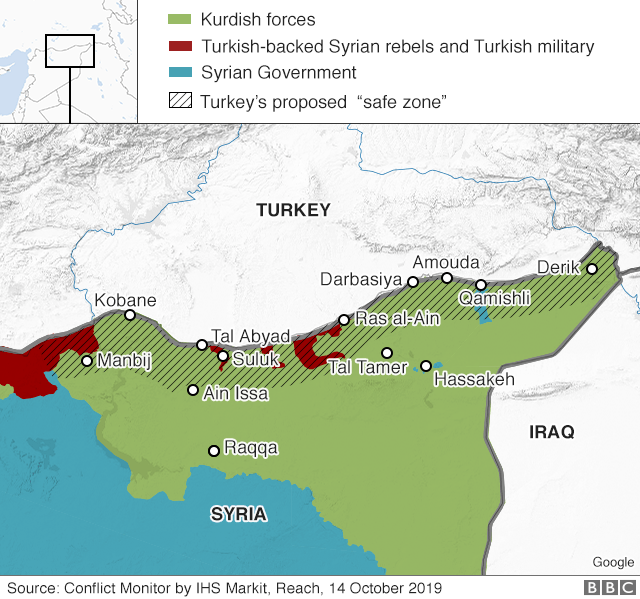So with his customary deft strategic touch Trump has:
- managed to anger his own party and Nato allies
To avoid 1000 soldiers from being caught in the cross-fire of a conflict they cannot manage because everyone in the fight is in 'allie' - that is if we are to consider the standard being our relationship with the kurds.
The risk of being caught in the cross-fire wouldn't be there if Trump hadn't caved to Erdogan and instead planned his exit a little better.
What would be a good exit strategy look like in a region consumed by civil war and regional interests?
Also, I'd say most nations and people will consider it a backstab regardless of the technicalities of the relationship.
Sure, but technicalities out way the opinion of your average citizen who just began paying attention to this conflict.
- backstabbed his own Kurdish allies, making the US seem less trustworthy
Back stab the Kurds, or back stab Turkey a Nato member and key allie in the region.
Or backstab neither by taking an active part in negotiating a solution?
Negotiations have been going on for close to a year but neither side (those sides being Turkey and Kurds) will not give into one anothers demands. Hence, Turkey made a choice and so did the U.S.
- allowed a wannabe dictator to relaunch the Ottoman empire
The relaunching of the Ottomon Empire began before the Syrian civil war.
So we should then just let it run its course?
The course is running itself, we all saw to that.
Every action has an equal and opposite reaction, and the Muslims have a very good memory.
- greatly risked the resurgence of Daesh
Daesh is the least of anyone's worries now.
The paradigm has shifted away from the terror narrative, regional conflicts between states on borders of influence are back in fashion do to necessity, i.e. Russia/Ukraine, India/Pakistan, Japan/China/Taiwan/PacificIslands, EU/Russia, Turkey/Syria/Isreal/Iran/Arabia, Turkey/Russia, U.S./China, etc
It could easily become a relevant issue again if the war in Syria turns hot and messy.
If Turkey returns in force against Syria -and armor divisions have just been moved into the region on a larger scale- then what is to come is far more terrifying.
- wasted billions of dollars, hundreds of thousands of lives and years of meddling
Yes, U.S. and several E.U. states did this.
So why no try to make sure the exit is clean?
What does a clean exit look like...?
- let his geopolitical enemies Russia/Syria/Iran take home the middle east
The contentions with these nations began before Trump came into office and the meddling in Syria is the thing that forces Russia, Iran, and Syria to respond. Why? Because if they do not respond with force the literal existence of their states is at risk.
Geopolitical enemies are far more likely to involve themselves in your affairs if you are involving yourself in assets that dictate their survival.
I'm not blaming the meddling in the middle east on Trump. I'm saying the US, regardless of president, has a responsibility to handle its own mess and Trump is not doing nearly enough.
"So with his customary deft strategic touch Trump has:" followed by bullet points alludes to you perceiving all of those bullet points as a consequence of Trump.
Hysteria corrodes objectivity and analysis and your statement is seemingly hysterical.
I agree we must be responsible but what is a responsible decision atm is very hard to say. Funding more rebels in the region -which got us all into this mess in the first place- or supporting Assad against a NATO member seems irresponsible to me.
Inquirer said:So you don't think the US had any way of forcing some kind of settlement, even a short-term one, between Turkey and the Kurds? Such as, for instance, tell the Kurds they'd have to give up that thin strip of safe-zone land in return for continued support.
No, I've been following the negotiations on this for roughly 5 months what your stating here is really what we tried to do but relationship between the Kurds/Turks destroyed the possibility. The Turks have a way stronger hand then we do to the nature of our established relationship over the past two decades and their willingness to do what they have to.
We essentially do not have the will to manage this fight and Turkey sees this invasion as necessary.
They look desperate to me, even striking a deal with Assad despite knowing they'd probably be fucked over at the earliest convenience.
Yes, they are in a desperate situation and are 100% viewed as an expendable by Assad.
There best hope to survive is this deal with Assad which is essentially an exchange of key cities for support.
Now this may seem confusing because because I stated the Kurds will not give up land. The reality is they will not give up land they consider to be theirs which are regions of Northeast syria. The territories they are conceding are in North Western Syria.
Syria is under threat by this Turkish invasion and so is Russia, hence the logical move for Syrians is to use the Kurdish North Eastern territory as a buffer zone to corrode down Turkish momentum.
Again, no one is blaming Trump for everything. But it's not unreasonable to criticize him for shirking responsibility and allowing negative developments to take place without (seemingly) trying to hinder it.
That is very fair.


